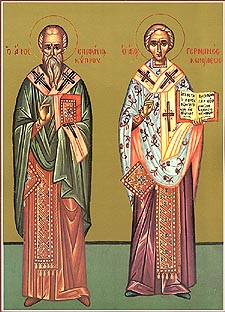|
|||
|---|---|---|---|
| This weekly bulletin insert complements the curriculum published by the Department of Christian Education of the Orthodox Church in America. This and many other Christian Education resources are available at http://dce.oca.org. | |||

Saint Epiphanius, Bishop of Cyprus, was born into a Jewish family in Judea early in the fourth century. Well-educated, Epiphanius always looked deeply into the great questions of life. So when, as a Jew, he heard about Jesus Christ, he pondered the possible truth of Christ's teachings. He was powerfully affected by the example of an elderly monk named Lucian, who gave anything he gathered or received as a gift to the poor. Lucian encouraged the younger man to study the Christian faith. Epiphanius was drawn to the compassion of Jesus Christ as shown in the Gospels and reflected in Lucian and others. But he also had to consider the validity of Christ's claim to be the divine Messiah, since this was blasphemy in the Jewish faith. He may well have worked through the same questions that a 21st-century Jewish convert to Orthodoxy, Father James Bernstein, ponders in his thoughtful book, "Surprised by Christ." Father James writes that as a young man studying the New Testament he, too, was attracted to the Man who "conducted Himself with what appeared to be truly supernatural grace, wisdom and love" even when attacked. So Father James also had to confront the claim of divinity that this Man made. Seeing that Jesus Christ forgave sins, accepted to be worshipped, and claimed the great title of "I AM" convinced Father James of Christ's divinity. This led him to the understanding that the Incarnation was the greatest love God could show. As he writes, God showed that love by "manifesting Himself as a creature and speaking to us directly, rather than in sending a creature of His [such as an angel] to do the 'dirty work' for Him." Once Saint Epiphanius was baptized and became a monk, he carried on Lucian's example, drawing others to the faith by the way he lived. But fearful of the praise he was receiving, he withdrew to the remote desert to pray intensely. As sometimes happened in that wild area, he was accosted and held captive by robbers for several months. He used the time to offer them the Gospel. When the robbers finally released him, one of them left the others and followed him to the monastery. The man was baptized with the name John, and became Epiphanius' close companion.
Epiphanius could be curt and abrasive; some people disliked him. He had disagreements with others, possibly including Saint John Chrysostom. But he defended the faith bravely, and his writings are still appealing. For example, he wrote that the Church "admires and praises virginity with humility, praises widowhood, and honors and accepts the chaste bond of marriage." All these kinds of life, in other words, can equally be paths to the Kingdom. Perhaps it was this welcoming vision of Christ's Church that enabled Epiphanius to spread the faith, despite his human failings. He himself was welcomed by Christ in the fourth century, just as we are in the twenty-first. |
|||

